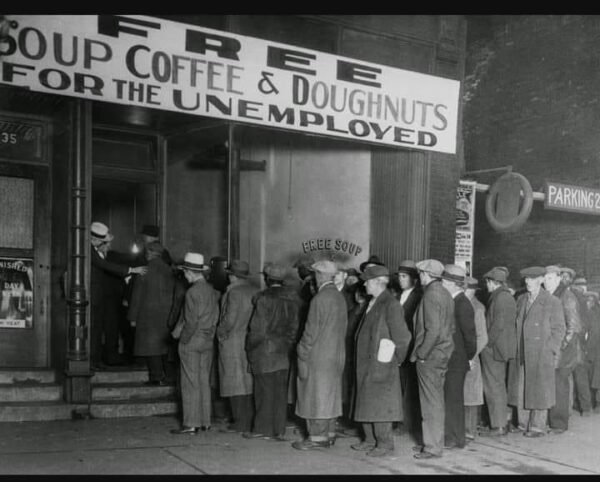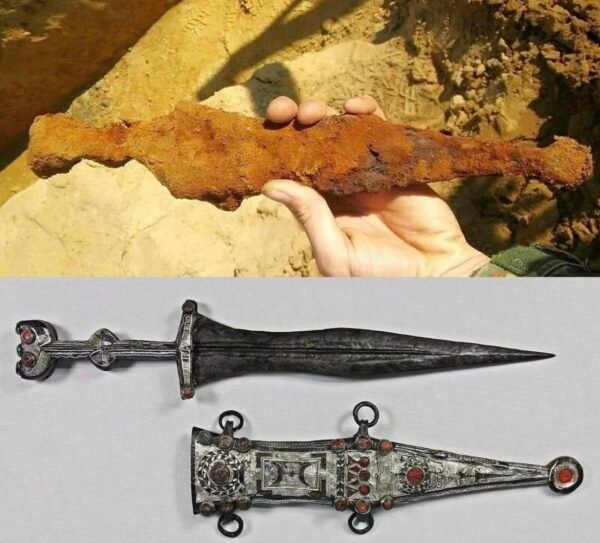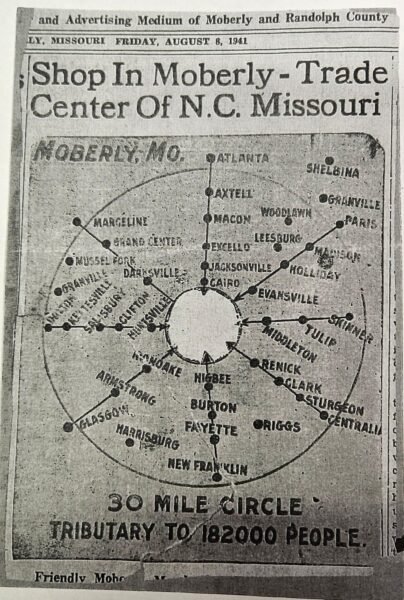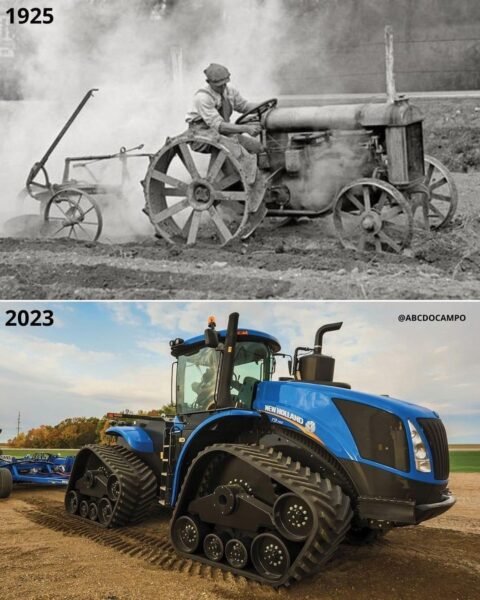Al Capone: a name synonymous with organized crime, bootlegging, and violence in the roaring 1920s and early 1930s. Yet, in an unexpected twist, this notorious gangster also played the role of a benefactor during one of America’s darkest times—the Great Depression. Amidst a period of immense economic despair and widespread unemployment, Capone opened a soup kitchen in Chicago, providing free meals to those struggling to survive.
This seemingly contradictory act by one of the most infamous figures in American criminal history paints a complex picture. It challenges us to look beyond the conventional narrative and explore the depths of human complexity. Capone’s soup kitchen wasn’t just about feeding the hungry; it was a symbol of unexpected generosity from an unlikely source.
In this article, we delve into the story of Al Capone’s soup kitchen, examining its impact during the Great Depression and exploring the multifaceted nature of Capone’s character and legacy.

The Great Depression and Its Impact on America
The Great Depression, which began with the stock market crash of 1929, was a time of unprecedented economic hardship in the United States. Millions of Americans were out of work, and families across the nation struggled to put food on the table. The country’s economic fabric was unraveling, leading to widespread poverty and despair.
Unemployment and Poverty: Unemployment rates soared, reaching as high as 25%, and those who managed to keep their jobs faced wage cuts and reduced hours. The impact was profound and pervasive, affecting people from all walks of life.
The Struggle for Survival: The daily struggle for survival became a harsh reality for many. Soup kitchens and bread lines became common sights in cities, as charitable organizations and individuals stepped up to provide relief to the hungry and destitute.
A Time of Contrasts: Amidst this bleak landscape, there were contrasting episodes that highlighted the complexity of the era. One such example was the world of bootlegging and organized crime, which flourished under Prohibition. Criminal figures like Al Capone in Chicago and the Birger Gang in Southern Illinois capitalized on the ban of alcohol sales. For a deeper understanding of this aspect of the era, explore “The Birger Gang: Southern Illinois Bootleggers, 1924,” which delves into the notorious activities of another gang during this tumultuous period.
In the next section, we will focus on Capone’s soup kitchen in Chicago, a beacon of hope amidst the despair of the Great Depression.
Capone’s Soup Kitchen: A Haven in Hard Times
In the midst of the Great Depression’s despair, Al Capone’s soup kitchen emerged as a surprising emblem of relief and compassion in the heart of Chicago. It stood in stark contrast to Capone’s notorious reputation as a ruthless gangster.
Location and Operations: Capone’s soup kitchen was located on South State Street, one of Chicago’s busiest thoroughfares. It was strategically placed to be accessible to the maximum number of people in need. The kitchen operated efficiently, serving meals to thousands of unemployed and destitute individuals every day.
The Menu and Service: The meals served were simple yet nourishing, typically consisting of soup, coffee, and bread. The kitchen didn’t just provide food; it offered a semblance of dignity and normalcy in turbulent times. The staff, paid by Capone, ensured that everyone who walked in was treated with respect and care.
Public Reaction: Capone’s soup kitchen was met with a mix of skepticism and gratitude. While some saw it as a genuine act of charity, others viewed it as a calculated move to garner public sympathy and improve Capone’s tarnished image. Regardless of the motive, the impact of the soup kitchen was undeniable—it provided much-needed relief during a period of severe hardship.
A Broader Perspective on the Era: The existence of such a soup kitchen during the Great Depression sheds light on the era’s complexities. To gain a more personal perspective on life during this time, one can read about the experiences of a young girl in Missouri, as detailed in “Life of a Young Girl During the Great Depression in Missouri, USA, 1930s.” This story offers a poignant glimpse into the daily realities faced by ordinary people during one of America’s most challenging periods.
Public Perception and Media Coverage
Al Capone’s soup kitchen, amidst the despair of the Great Depression, elicited a variety of responses from the public and the media. This philanthropic act by a notorious gangster sparked debate and left a complex legacy.
Skepticism and Praise: While some members of the public remained skeptical of Capone’s motives, questioning whether it was a mere public relations stunt to mask his criminal activities, others praised the effort. For many struggling to survive, the kitchen was a lifeline, regardless of Capone’s intentions.
Media’s Role: The media played a significant role in shaping public perception of Capone’s soup kitchen. Newspapers at the time provided extensive coverage, some portraying Capone as a Robin Hood-like figure, while others remained critical, highlighting his criminal background.
Altruism or Image Polishing?
This dichotomy raises the question: Were Capone’s actions driven by genuine altruism, or were they a strategic move to improve his public image? The answer likely lies somewhere in between. While the soup kitchen provided undeniable aid to those in need, it also served to humanize Capone in the eyes of the public and potentially divert attention from his criminal activities.
The Legacy of Capone’s Soup Kitchen
Despite the mixed views on his motivations, the impact of Capone’s soup kitchen during the Great Depression remains a noteworthy chapter in American history. It serves as a reminder of the era’s complexities and the unexpected ways in which help can arrive.
Revisiting the Dichotomy of Al Capone’s Legacy
Al Capone, often remembered for his life of crime, also left a mark as an unlikely benefactor during one of America’s most challenging times. His soup kitchen in Chicago during the Great Depression stands as a testament to this contradictory aspect of his life. It challenges us to look beyond black-and-white narratives and acknowledge the multifaceted nature of historical figures.
Capone’s soup kitchen story is more than just a tale of charity; it’s a reflection of the human capacity for surprising and complex actions. It reminds us that history is often painted in shades of gray, filled with characters who defy easy categorization.
Was Capone’s Soup Kitchen Unique in the Era? While Capone’s soup kitchen was notable due to his infamy, it was not the only charitable effort during the Depression. Many individuals and organizations set up similar soup kitchens across the country to help those affected by the economic downturn.
How Did Capone Fund the Soup Kitchen? Al Capone funded the soup kitchen from the profits of his various illegal enterprises, including bootlegging and gambling. This funding source added to the complexity of public opinion about his charitable work.
Did the Soup Kitchen Change Public Opinion About Capone? The soup kitchen did soften some people’s views of Capone, showcasing a more compassionate side to the notorious gangster. However, it did not significantly alter his overall public image as one of America’s most infamous criminals.
Were There Any Negative Repercussions for Capone? While the soup kitchen improved Capone’s image in some circles, it did not mitigate the legal troubles he faced. Capone’s criminal activities, particularly tax evasion, ultimately led to his conviction and imprisonment.
What Happened to the Soup Kitchen After Capone’s Incarceration? The soup kitchen closed shortly after Capone’s incarceration. Without his financial backing and organizational influence, the operation could not sustain itself.
Does Capone’s Philanthropy Affect How Historians View Him? Capone’s philanthropic efforts, including the soup kitchen, are often viewed by historians as a complex layer to his character. While these actions show a different side to Capone, they do not overshadow his criminal activities and their impact on society.
As an Amazon Associate we earn from qualifying purchases through some links in our articles.




